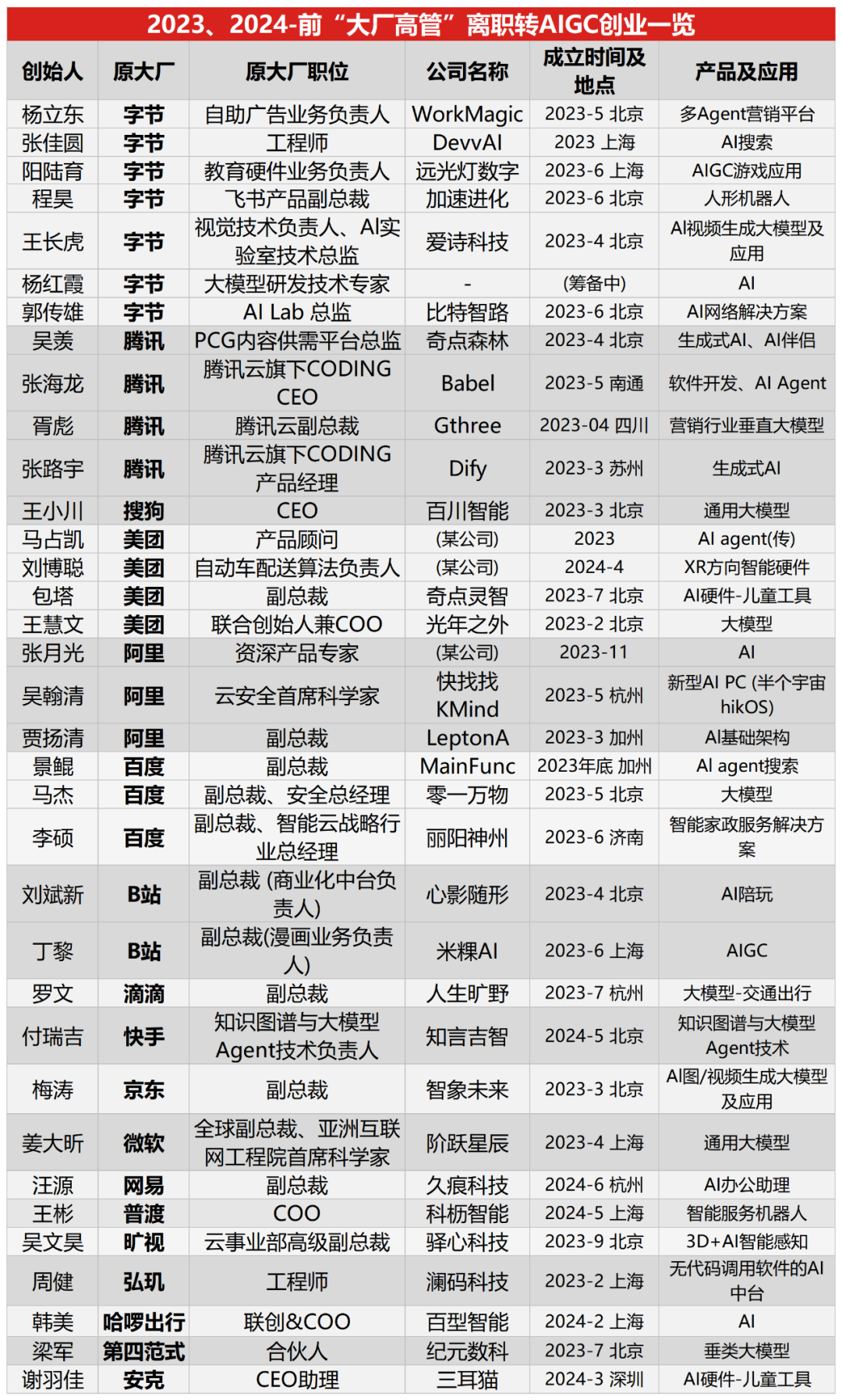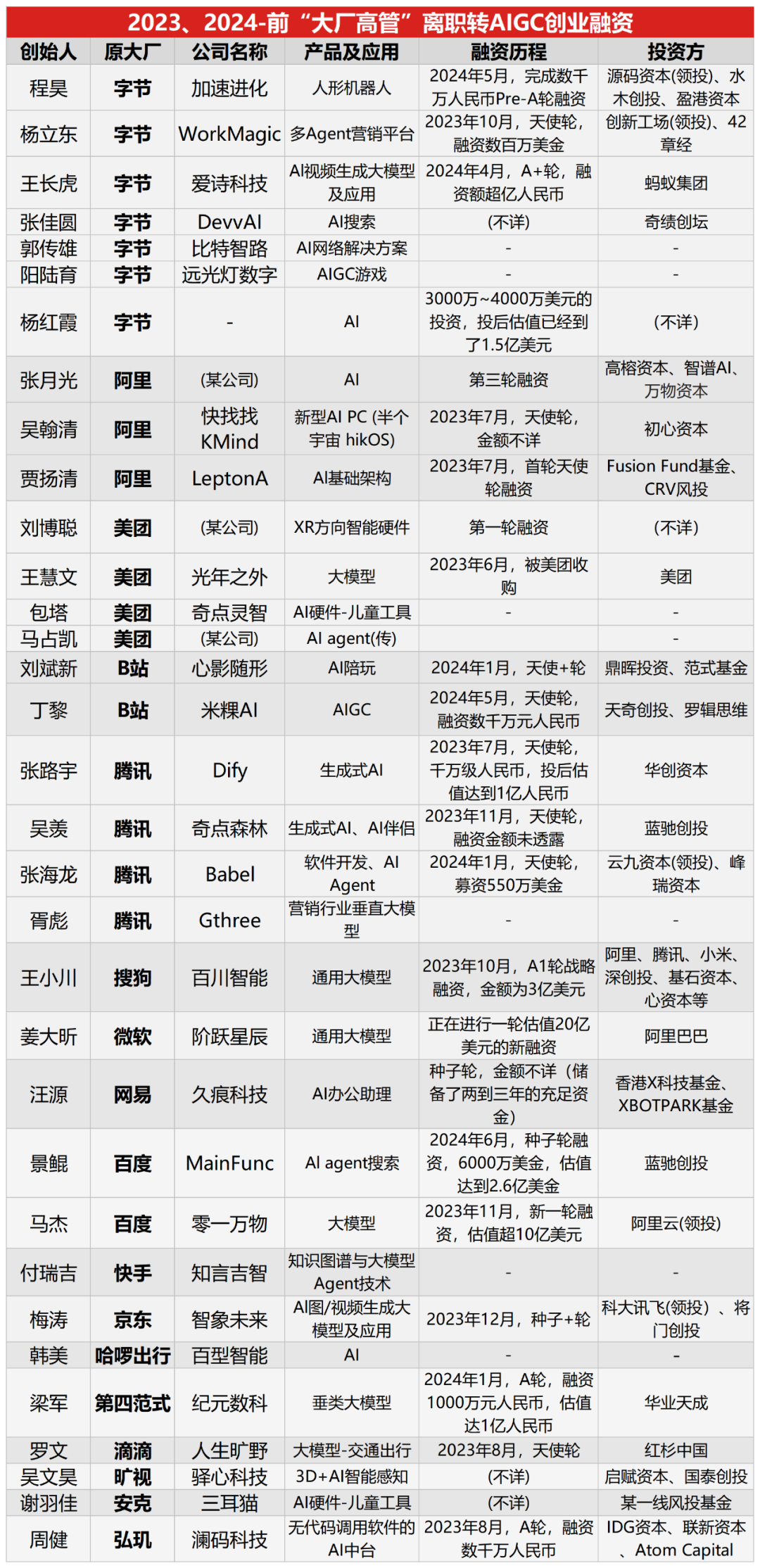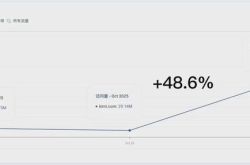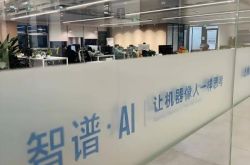34 executives from major tech companies are pivoting to AI! ByteDance becomes the "base camp" for startups, with Agent and vertical large models as the most promising directions
![]() 07/02 2024
07/02 2024
![]() 518
518
Since Wang Huiwen, the co-founder of Meituan, took the lead in February last year, executives from major tech companies have successively ventured into large models and AI. According to a compilation by Wuyajun, at least 34 executives from internet giants have been exposed to pivot to large models and AI startups since 2023.
Among the 34 executives, there are up to 7 entrepreneurs with ByteDance backgrounds, accounting for 20.59%. This has also made ByteDance replace Baidu as the largest talent supplier in this round of AI executive entrepreneurship wave.
It's worth noting that in the previous AI wave, Baidu was the tech giant that "exported" the most entrepreneurs, with up to 26 AI companies founded by its "disciples." However, now there are only 3.
The change in the number of entrepreneurs reflects, to a certain extent, the shift in competitiveness among tech giants. The rise and fall also prove indirectly that ByteDance is the most dynamic company among internet companies, without a doubt, while Baidu's density of innovative talent is declining.
As the other two most watched tech giants, Alibaba and Tencent have different performances. Although not many people from Alibaba have emerged, their quality is surprisingly high, with Zhang Yueguang, Wu Hanqing, and Jia Yangqing as the best proof. Meanwhile, entrepreneurs from Tencent tend to be more low-key.
In terms of entrepreneurship directions, the largest number of entrepreneurs choose to enter the application layer, with up to 15, while 11 entrepreneurs enter the model layer. Among the application layer, Agent is the most chosen landing scenario by executives. In the model layer, apart from a few executives exploring general large models, most prefer to bet on vertical large models.
From the financing perspective, these executives from major tech companies are becoming the "hot cakes" for investors. Zhang Yueguang, the former head of Miaoya Camera, secured three rounds of financing within less than half a year since starting his business. Meanwhile, Jing Kun's AI search company secured $60 million in seed funding.
These phenomena indicate that the funding trend in the model layer has continued to the application layer, with financing resources further concentrating on the top. This is not difficult to understand, as in the uncertain AI industry, nothing is more certain than people.

/ 01 / Replacing Baidu, ByteDance becomes the "base camp" for executives' AI entrepreneurship
From the perspective of establishment time, 2023 was the year when the most executives from major tech companies entered the AI field. 27 of them established their own AI companies last year, with at least 20 of them doing so in the first half of 2023.
This suggests that these executives chose to dive into the field immediately after the release of ChatGPT. For example, Jia Qingyang, the vice president of Alibaba, was exposed to leaving his job and founding Lepton AI last March.
To a certain extent, this indicates that these executives have a high consensus on AI opportunities and are particularly resolute in their bets.
From the perspective of entrepreneurs' backgrounds, ByteDance has contributed the most talent to this wave of entrepreneurship by executives from major tech companies. Among the 34 entrepreneurs, 7 have ByteDance backgrounds, accounting for 20.59%, including Yang Luyu, Cheng Hao, Guo Chuanxiong, Yang Lidong, Wang Changhu, Zhang Jiayuan, and Yang Hongxia.
This proves once again that ByteDance remains the most dynamic company among internet companies, without a doubt.
Meituan and Tencent rank second, both with 4 entrepreneurs. Among them, the four from Meituan are Wang Huiwen, Liu Bocong, Bao Ta, and Ma Zhankai.
The most famous entrepreneur is naturally Wang Huiwen. At the beginning of 2023, he announced his entry into the AI field and invested $50 million to found Guangnian Zhiwai Technology Co., Ltd., aiming to build China's OpenAI.
Later, due to personal health issues, Wang Huiwen withdrew from the daily management of Guangnian Zhiwai, and Meituan fully acquired it. Recently, Wang Huiwen returned to Meituan as a consultant.
Ma Zhankai has a similar trajectory to Wang Huiwen. Since 2010, he has served as a consultant for Meituan.com, advising on the development of group-buying websites. In March 2023, he announced his joining Guangnian Zhiwai Technology, founded by Wang Huiwen, one of the founders of Meituan. After Guangnian Zhiwai was acquired by Meituan, Ma Zhankai is reportedly working on AI agent-related ventures.
The entrepreneurs from Tencent are Zhang Luyu, Wu Xian, Zhang Hailong, and Xu Biao. Among them, Xu Biao served as the vice president of Tencent Cloud and ventured into the AIGC field last year, founding Gthree.
Currently, Gthree's strategy is to focus on marketing content, including copywriting, images, or videos, using generative AI to improve the production efficiency and effectiveness of marketing content.
As one of the tech giants that cultivate the most entrepreneurial talent, although not many people from Alibaba have emerged, their quality is surprisingly high. The entrepreneurs from Alibaba are Zhang Yueguang, Wu Hanqing, and Jia Yangqing.
Among them, Wu Hanqing was the chief scientist of Alibaba Cloud Security, Jia Yangqing served as the vice president of Alibaba, and Zhang Yueguang was the main person in charge of Miaoya Camera, Alibaba's popular product last year.
Baidu's situation is similar to Alibaba's. Since 2023, a total of 3 vice presidents from Baidu have ventured into entrepreneurship, namely Jing Kun, Ma Jie, and Li Shuo. This is understandable as Baidu, as the tech giant that attaches the most importance to the AI industry in China, has been renowned for its AI strategy for a considerable period and possesses a profound talent pool.
However, it must be said that compared to the performance of Baidu-affiliated entrepreneurs in the previous AI wave, there is still a significant gap in this round.
In the previous AI wave, up to 26 AI companies were founded by Baidu's "disciples," covering areas such as robotics, deep learning, speech, and natural language understanding, including well-known companies like Horizon Robotics, Jingchi Technology, and Pony.ai.
The截然不同的表现 in the two AI waves perhaps indicates that Baidu's density of innovative talent is declining.
/ 02 / Over 40% of executives flock to AI applications, most optimistic about Agent and vertical large model opportunities
From the perspective of entrepreneurship directions, AI applications are the most chosen direction by these executives from major tech companies.
Among the 34 executives, 15 have chosen AI applications as their entrepreneurship direction, accounting for 42.86%. Many of them have invested in exploring applications in the Agent field.
For example, Jiuhen Technology, founded by Wang Yuan, the former vice president of NetEase, positions its first product as a "general office assistant centered on personal data," helping individuals complete various typical knowledge work such as attending meetings, responding to messages, replying to emails, reading documents, writing reports, and managing schedules.
In addition, Yang Lidong, Ma Zhankai, Zhang Hailong, and Fu Ruiji are also exploring the application landing of Agent.
Apart from AI applications, large models are the second most popular entrepreneurship direction for executives from major tech companies.
Since 2023, a total of 11 executives from major tech companies have chosen to venture into the large model field. Among them, only a few executives such as Wang Xiaochuan and Jiang Daxin have bet on general large models, while most executives venturing into the model layer prefer to bet on vertical or edge-side large models.
Last year, Li Shuo, the former vice president of Baidu, and Yangguang Dajie Group jointly founded Liyang Shenzhou. At the end of last year, Liyang Shenzhou released the country's first large model for the home service industry, which is based on industry knowledge accumulated by Yangguang Dajie over 20 years and practical data from tens of thousands of service personnel. It is the first large model application in China that combines "thought chain + action chain".
Another example is Aishi Technology, founded by Wang Changhu, which focuses on AI video generation models and applications.
The overseas version of the product, PixVerse, officially launched in January 2024. According to data from the third-party monitoring platform SimilarWeb, PixVerse reached over 1.4 million monthly visits within 3 months. In March this year, the Aishi video large model also officially launched its internal beta test.
In terms of edge-side models, Yang Hongxia from ByteDance officially left ByteDance in late May and aimed her entrepreneurship at edge-side models, focusing on AI agents.
In the field of AI hardware and infrastructure, there are also 4 executives from major tech companies venturing into entrepreneurship. Among them, Cheng Hao, the vice president of Feishu products, chose humanoid robots for his entrepreneurship, while Bao Ta from Meituan and Xie Yujia from Anker Innovation coincidentally chose the direction of children's AI hardware. Xie Yujia's Sanercat Technology has received investment from leading venture capital funds.
/ 03 / Financing concentrates on top-tier companies, entrepreneurs become the greatest certainty in AI investments
Based on publicly disclosed information, 21 companies founded by executives among these 34 entrepreneurs have secured financing, accounting for 61.76%.

Among them, some star entrepreneurs are sought after by investors, not only completing multiple rounds of financing in a short period but also securing financing amounts far exceeding industry norms.
For example, Zhang Yueguang's new company, Muyanzhiyu, has completed multiple rounds of financing in less than half a year since its inception, when its new product is still in the research and development stage. Its valuation has exceeded $100 million.
Jing Kun and Yang Hongxia are also favored by investors. Jing Kun's AI search company secured $60 million in seed funding, with a valuation of $260 million. While Yang Hongxia's team is still in the formation stage, it has secured investment of $30 to $40 million, with a post-investment valuation of $150 million.
It is evident that in the current wave of AI entrepreneurship by executives from major tech companies, two types of talent are the most popular among investors:
One is those who have a deep understanding of niche scenarios and products and have proven their abilities.
For example, investors favor Zhang Yueguang due to the success of Miaoya Camera. Last year, the "Miaoya" portrait-style AIGC product developed by the Alibaba team became popular for its excellent rendering effect and high usability. Zhang Yueguang, the product manager of Miaoya Camera, was also known as "the first batch of AIGC product managers".
Jing Kun, on the other hand, has extensive experience in search. Having joined Baidu in 2014, he served as the chief product architect of Baidu Search and the chairman of the Search Product Committee, promoting the incubation and implementation of multiple innovative products such as DuerOS. AI search is currently the biggest consensus in AI applications, making Jing Kun one of the best bets.
The other type is those with solid technical backgrounds in AI. For example, Yang Hongxia was the technical head of Alibaba DAMO Academy's trillion-parameter multi-modal pre-training model M6 and participated in the "Wudao" large model project led by the Beijing Academy of Artificial Intelligence, which is one of the earliest large model projects in China.
In early-stage investments, the greatest certainty is always people, especially in the AI industry, where the path to implementation is not yet clear. In the uncertain AI industry, the ability of entrepreneurs themselves is perhaps the only thing that investors can grasp and the most certain thing.








